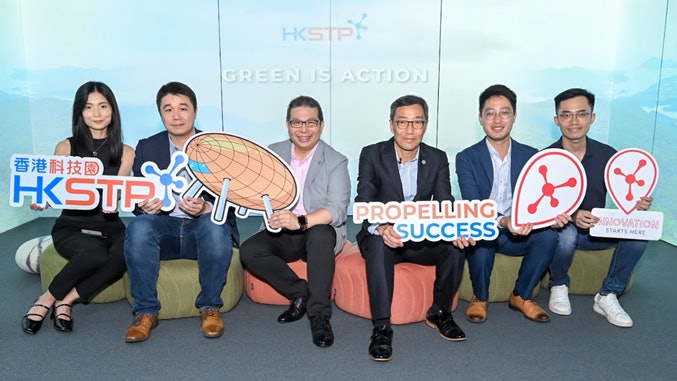HKSTP took advantage of World Environment Day today (6 June) to launch the "Green is Action" event to unveil the details of its Net Zero Vision 5, which aims to ensure that HKSTP's operations meet the net-zero emissions standards set out in the Science Based Reduction Targets Initiative (SBTi) by 2045.
HKSTP said it will be the first statutory body in Hong Kong to make a net-zero commitment under the SBTi standard, five years earlier than the carbon neutrality target set out in the Hong Kong Climate Action Plan 2050, in support of the Financial Secretary Paul Chan's goal of promoting Hong Kong as an international centre for green technology and green finance as set out in the 2023/224 Budget.
Hong Kong Science and Technology Parks Corporation announced that it will ensure that its operations meet the net-zero emission standards set out in the Science Based Reduction Initiative (SBTi) by 2045. (Photo courtesy of HKSTP)
Aiming to reduce carbon emissions by 2030% by 42
According to HKSTP, SBTi's Corporate Net Zero is one of the world's most recognized emission reduction target frameworks based on climate science, and contains guidelines, targets and recommendations for companies to set their net-zero emissions standards in line with limiting the overall increase in global warming to 1.5 degrees Celsius. In accordance with SBTi's Scope <>, <> and <>, the Company has set short- and long-term emission reduction targets covering its daily operations and its value chain.
The short-term goal is to have by 2030:
(i) Reduce carbon emissions from daily operations by 42% (Scopes <> and <>);
(ii) Value chain carbon emissions (Scope 3):
Reduce carbon emissions from downstream leased assets such as tenants and waste by 25%; Reduce carbon intensity per square meter of capital goods such as embodied carbon emissions by 52%. In order to achieve the relevant goals, the park has begun to plan a carbon reduction roadmap, focusing on building energy efficiency, re-calibration and retrofit.
CEO Albert Wong: I hope to take the lead
Albert Wong, Chief Executive Officer of HKSTP, said that Hong Kong is rapidly developing into a leader and pioneer in the green technology and green finance innovation market, and hopes that the Vision of Net Zero 2045 will play a leading role in setting new targets for the industry and making more local companies and industries aware of the feasibility of setting a net-zero target.
He said HKSTP is striving to build a green technology and green finance ecosystem to expand climate and sustainable innovation from Hong Kong to the world, while introducing green innovation solutions from around the world to Hong Kong. HKSTP already has more than 100 green technology companies, which he believes will help promote green innovation and investment, which in turn will drive more technological innovation and innovation achievements.
Mr Albert Wong, Chief Executive Officer of HKSTP, shared that introducing more green innovation solutions will help promote green innovation and investment. (Photo courtesy of HKSTP)
HKSTP, together with a number of green technology companies, demonstrates how the Science Park ecosystem drives world-class innovation, with examples as follows:
Ms Wong, Archireef's sustainability strategist, said that the company is committed to improving marine biodiversity and making a positive impact on nature, and last year expanded its business to Dubai, United Arab Emirates, and will continue to think globally to protect corals around the world.
Chu Yihao, co-founder of i2Cool, said that the company is committed to integrating innovative energy-saving technologies into daily life to alleviate energy shortages, and the passive radiant refrigeration coating was inspired by the Sahara desert silver ant, whose skin structure has a self-cooling function, allowing ants to survive in extreme environments.
Wang Chunheng, Assistant Manager of Universal Concept Studio Limited, said that it is more important to develop high-performance indoor environmental control systems to protect people's health, and hopes that Flatcool Technology can be applied to other building areas, such as high-performance data centers, hospitals and transportation hubs, to help reduce carbon emissions.
Chen Shi, Executive Director of Neuron Digital Group, said that in the local construction industry, buildings account for 90% of the total annual electricity consumption and generate 60% of carbon emissions, and Neuron provides feasible solutions for different industries to improve energy efficiency and reduce carbon emissions.
Become an eco-hipster! HK Electric's "Green Happy Program" Practices Intelligent "Type" Carbon Neutrality and Carbon Neutrality with You|Standard Chartered Materials Greater Bay Area to achieve carbon neutrality goal Need to invest an additional US$1.84 trillion in hydrogen energy|Energy relies on imports Policy unchanged How Hong Kong Enters "Carbon Neutrality" HKUST Guangzhou Launches "Carbon Neutrality and Climate Change" School Next year's undergraduate recruitment China Construction Hong Kong 3 project won the Hong Kong Environmental Excellence Award Carbon Neutral Green Project O⬝PARK2 won gold, Jockey Club Environmental Protection Building won Green Building Platinum certification again Positioned as an environmental protection laboratory Towards Carbon Neutrality, Green Building Council Holds Student Competition to Promote "Net Zero Built Environment" to achieve carbon neutrality by 2050
